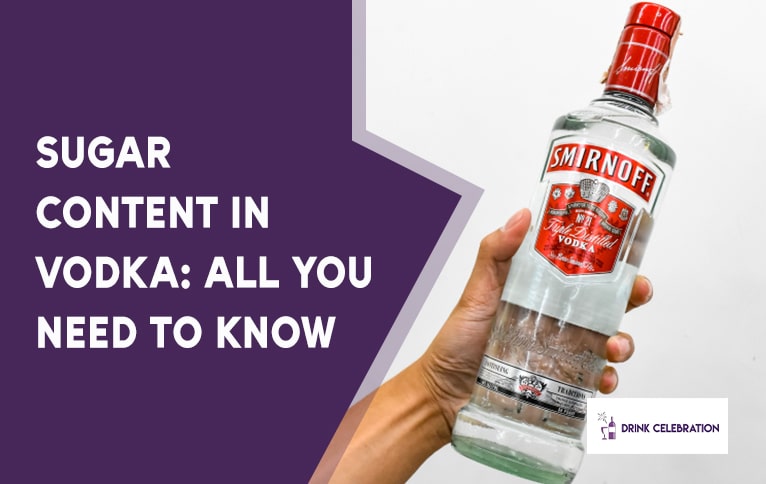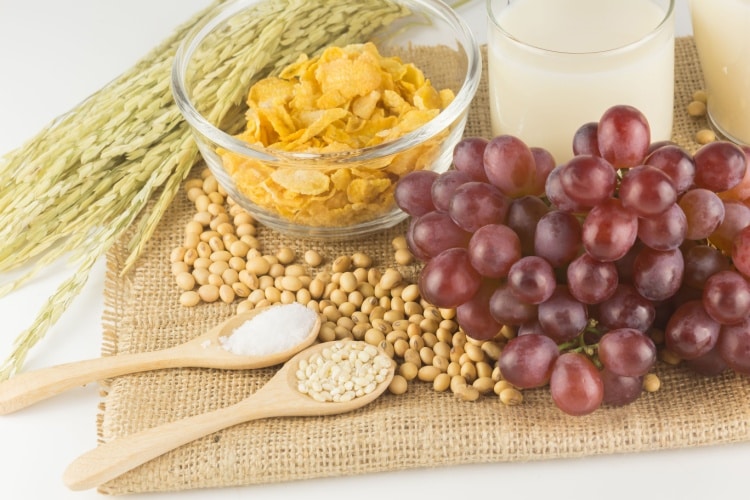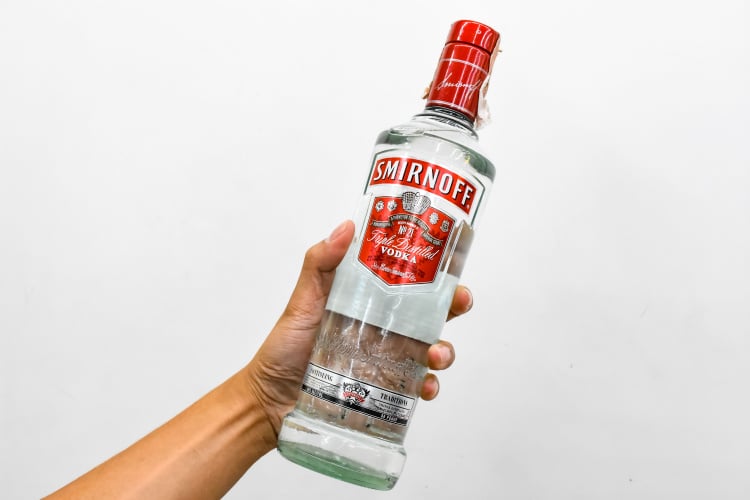Vodka stands out as a top choice among spirits for those seeking a sugar-free alcohol option. Its clear, smooth character has made it a staple in bars and homes, appealing to health-conscious consumers.
Many believe vodka lacks sugar, but how accurate is this? We’ll scrutinize the composition of this drink to reveal the truth behind its sugar content and its place in our healthy diets.

What is Vodka Made From?
Vodka is traditionally crafted from water and fermentable ingredients, typically grains such as wheat, rye, corn, or barley. Some vodkas are made from potatoes, molasses, soybeans, grapes, rice, or byproducts of oil refining or wood pulp processing.

Each base ingredient adds a unique character to the vodka, although the final product is typically a neutral spirit.
The Sugar Content of Vodka Vs. Common Drinks
Vodka, by definition, is almost entirely devoid of sugar. The fermentation and distillation process eliminates it from the base ingredients.
It starts with a fermented base of grains or potatoes containing natural sugars. The mixture is heated until the alcohol turns to vapor. This vapor is then condensed back into liquid form. Since sugars do not vaporize at the same temperature as alcohol, they are left behind, resulting in distilled spirits that are virtually sugar-free.
Let’s see how vodka compares with other flavored drinks and alcoholic beverages in terms of sugar content:
- Diet Soda: This go-to beverage doesn’t contain real sugar or calories but uses artificial sweeteners and additives linked to Type 2 diabetes.
- Iced Tea Club Soda: A 20-ounce bottle of sweetened iced tea contains 58 grams of sugar (15 teaspoons) and 219 calories.
- Orange Juice: A 240-ml serving of this drink can hold twice the calories and sugar of a whole orange.
- Lime-diluted Cranberry Juice: One cup can hold approximately 30 grams of sugar.
- Soda Water: This has zero carbs and sugar but also doesn’t have any vitamins in it.
- Pure Alcohol: One gram of pure alcohol has approximately seven calories but has zero sugar and carbs.
- Flavored Vodka: Many brands have sugar-free flavored vodkas, but some varieties used for sugary cocktails can have a minimal amount.
Unlike rum or bourbon, vodka doesn’t incorporate added sugars after distillation. Wine and beer naturally contain sugars from fermentation; a glass of white wine can have about 1.4 grams of sugar, while a beer might carry up to 0.3 grams per 100ml.
Misconceptions About Vodka Drinks and Its Sugar Content
Here are some of the most popular misconceptions about vodka’s nutritional value and sugar content.
Myth 1: Vodka Is High in Sugar Because It’s Made From Sugary Ingredients.
Though vodka’s base ingredients include grains or potatoes, which contain starches, the distillation process converts these starches into alcohol, leaving no residual sugars in the final product.
Myth 2: Flavored Vodka Has the Same Sugar Content as Regular Vodka.
Many flavored vodkas have additional sugars to enhance taste. For example, a shot of regular vodka contains zero grams of sugar. In contrast, the same amount of commercially flavored vodka, like caramel, cucumber, and honey melon varieties, can have several grams of sweetener.
Myth 3: Drinking Vodka Will Not Affect Blood Sugar Levels Because It’s Sugar-Free.
While vodka doesn’t contain sugar, alcohol can influence blood sugar levels and insulin response. This is why moderate alcohol consumption remains a rule of thumb, especially for individuals with existing health conditions.
Myth 4: Vodka Has No Calories Since It’s Sugar-Free.
Vodka contains calories from alcohol (ethanol), with approximately less than 100 grams per shot, independent of sugar content.
A regular alcoholic beverage provides significant energy—about seven calories per gram, almost as calorie-dense as fat. Even though vodka doesn’t contain sugars contributing to its calorie count, ethanol is where it’s coming from.
The Role of Vodka in a Low-Sugar Diet
Vodka can be a suitable option for a low-sugar diet due to its lack of inherent sugars. Its minimal impact on blood sugar levels makes it preferable over sweetened drinks or pre-mixed cocktails.
Despite having low sugar and virtually zero carbs, there are critical considerations for diabetics who are required to keep a low-carb diet:
- Alcohol can affect blood sugar control.
- Vodka does not contribute to carbohydrate intake.
- Drinking alcohol (including vodka) can lead to other health complications or escalate pre-existing ones.
- A standard shot of vodka (1.5 ounces) contains about 97 calories, primarily from alcohol.
- Vodka offers minimal dietary benefits. It lacks vitamins, minerals, and other nutrients.
Choosing the Right Vodka for a Healthier Lifestyle

Choosing low-calorie vodka drinks is essential when you’re focused on maintaining a healthy diet. There are many options, and knowing which to select can help align your alcohol consumption with your wellness objectives.
When looking at vodka nutrition facts, prioritize those unflavored varieties. The absence of flavoring usually indicates no additional sugars, making it a cleaner option. Brands like Absolut, Smirnoff, and Grey Goose offer unflavored varieties more likely to fit into a sugar-restricted diet.
If you enjoy flavored vodka, look for those that specify “no added sugar” on the label.
Another tip is to consider the alcohol content. Standard vodkas are typically 80 proof, which means they contain 40% alcohol by volume. Some brands offer 100-proof options or higher, which increase calorie content due to the higher alcohol level. Stick to the standard 80-proof to keep calorie intake in check.
It’s also worth emphasizing the importance of moderation. No matter which vodka you choose, responsible consumption is key. Not only does this approach promote better health, but it also aligns with dietary goals.
Conclusion
Vodka is nearly sugar-free, making it a viable choice for a health-conscious lifestyle. Remember, moderation is key in maintaining its low-sugar benefit. Educate yourself on alcohol content to set reasonable drinking limits and sustain a healthy lifestyle.